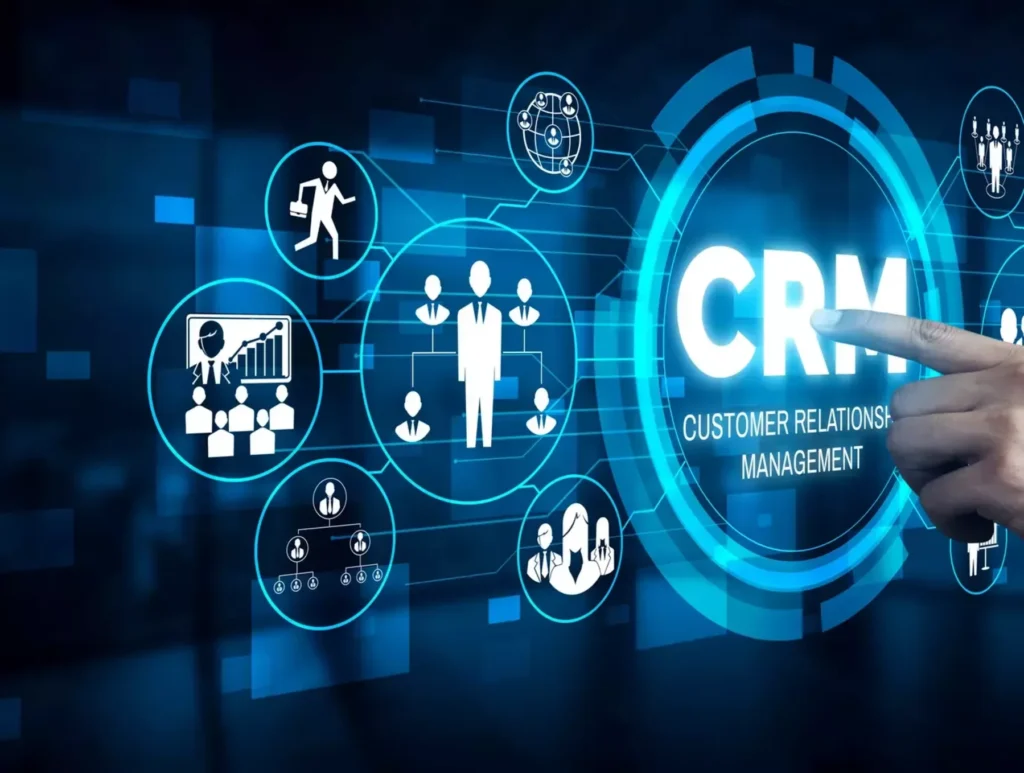Managing customer relationships is crucial for success so it’s important to understand CRM (Customer Relationship Management). This blog explores how CRM tools can streamline operations, improve customer retention, and boost sales by centralizing data and automating tasks. So, if you’re a small business carry on reading to learn how a CRM can transform your customer service and drive growth. Also, keep reading to find out how Finli offers a powerful CRM system at no extra cost.
What Is CRM (Customer Relationship Management)?
Customer Relationship Management (CRM) is both a strategy and a suite of tools that enable businesses to effectively manage interactions with current and potential customers. By organizing, automating, and synchronizing processes across sales, marketing, customer service, and support, CRM systems enhance overall efficiency.
The core objective of CRM is to strengthen customer relationships, boost retention, and drive business growth by delivering personalized experiences and tailored solutions based on real-time customer data.
CRM software centralizes customer information, tracks every interaction, and simplifies critical tasks such as managing sales leads, running targeted marketing campaigns, and improving customer service.
Why CRMs Benefits Businesses
CRMs benefits businesses by enhancing efficiency, customer satisfaction, and overall growth. Here are 7 key benefits:
- Improved Customer Relationships: CRM systems store detailed customer data, allowing personalized interactions that build stronger relationships.
- Enhanced Sales Process: CRM helps streamline the sales cycle and improves conversion rates by tracking leads and automating sales tasks.
- Better Customer Retention: CRM tools monitor customer interactions, providing insights that enable businesses to offer timely support and proactive service, reducing churn.
- Increased Productivity: Automating routine tasks like follow-ups, reporting, and data entry frees up time for teams to focus on higher-value activities.
- Data-Driven Decisions: With CRM analytics, businesses can access detailed reports on customer behaviors, sales performance, and marketing effectiveness, leading to more informed decision-making.
- Improved Collaboration: CRM centralizes customer information, enabling better communication and coordination across teams, from sales to customer service.
- Targeted Marketing: CRM data helps create tailored marketing campaigns, ensuring that promotions and messages reach customers at the right time.
These benefits ultimately increase customer satisfaction, revenue, and business growth.
Components Of a CRM
The main components of a CRM system include the following:
- Contact Management: Stores and organizes customer information such as names, addresses, phone numbers, and communication history in a centralized database, making it easily accessible.
- Sales Management: Helps track sales opportunities, manage sales pipelines, and forecast revenue. It automates sales processes and allows tracking progress on deals, from lead to close.
- Marketing Automation: Facilitates the creation, execution, and tracking of marketing campaigns. It enables personalized email marketing, segmentation, and campaign performance analysis.
- Customer Service Management: Tracks customer interactions and helps resolve issues quickly. It supports ticketing systems, live chat, and knowledge bases to improve service quality.
- Lead Management: Captures, tracks, and nurtures potential customers (leads) through the sales funnel until they convert to paying customers.
- Analytics and Reporting: Provides insights from customer data with detailed reports on sales, customer behavior, and campaign performance, helping businesses make data-driven decisions.
- Workflow Automation: Automates routine tasks like follow-ups, approvals, and document generation, improving operational efficiency and reducing human error.
- Mobile CRM: Allows access to CRM data via mobile devices, ensuring teams can stay connected and productive while on the move.
- Integration with Other Systems: A CRM integrates with other business tools such as email, social media, accounting software, and customer support systems to streamline operations and provide a comprehensive view of customer interactions.
These components work together to improve customer interactions, streamline processes, and drive business growth.
Types Of CRM Technology
There are three main types of CRM technology, each designed to address specific business needs:
1. Operational CRM: Focuses on automating and streamlining customer-facing processes such as sales, marketing, and customer service. The goal is to enhance efficiency and improve customer interactions across these functions.
- Sales automation: Manages and tracks sales activities, from lead generation to deal closure.
- Marketing automation: Automates repetitive marketing tasks like email campaigns, lead nurturing, and segmentation.
- Service automation: Helps manage customer service tasks like ticketing, live chat, and complaint management.
2. Analytical CRM: Designed to collect, analyze, and interpret customer data to provide actionable insights. It helps businesses understand customer behaviors, preferences, and trends to make informed decisions.
- Data mining: Identifies patterns and trends in customer data.
- Customer segmentation: Divides the customer base into meaningful segments based on behavior or demographics.
- Predictive analysis: Forecasts future customer behavior to optimize sales and marketing strategies.
3. Collaborative CRM: Aims to improve communication and collaboration between teams within a business (such as sales, marketing, and customer service) and between the company and its customers.
- Shared customer information: Ensures all departments can access the same up-to-date customer data.
- Cross-departmental collaboration: Facilitates better communication between teams for more efficient problem-solving and a unified customer experience.
- Customer interaction management: Integrates communication channels like email, social media, and call centers to maintain consistent interactions.
Each CRM type supports different aspects of business operations, and many businesses use a combination of these technologies to cover all facets of customer relationship management.
Why Do Companies Use a CRM?
Companies implement CRM systems to strengthen customer relationships, optimize operations, and fuel growth. Here are the key reasons businesses adopt CRM:
- Centralized Customer Data: CRM systems consolidate customer information in one place, making it easier for teams to access and use it for sales, marketing, and support.
- Enhanced Customer Experience: With detailed customer data, companies can offer personalized services, timely support, and tailored marketing, improving customer satisfaction and loyalty.
- Increased Sales Efficiency: CRM automates and organizes sales processes, helping businesses manage leads, track interactions, and close deals faster.
- Better Decision-Making: CRM analytics provide insights into customer behaviors, sales trends, and marketing campaign performance, allowing for data-driven decisions and strategy adjustments.
- Improved Customer Retention: CRM helps companies identify at-risk customers and retain them with targeted outreach by tracking customer interactions and offering proactive service.
- Streamlined Communication: CRM enables better coordination across sales, marketing, and support teams by ensuring they share up-to-date customer information and insights.
- Automation of Routine Tasks: CRM systems automate repetitive tasks like data entry, follow-ups, and reporting, freeing up time for employees to focus on more strategic activities.
- Scalability: As businesses grow, CRM systems scale easily, helping manage an expanding customer base and increasing operational complexity.
Overall, companies use CRM to strengthen customer relationships, boost efficiency, and drive sustainable growth.
Did you know that Finli customers get access to our state of the art CRM system with no additional cost? With just $39/month, you can use the instant invoicing system, payment management options, CRM, inventory management, autopay and more.




